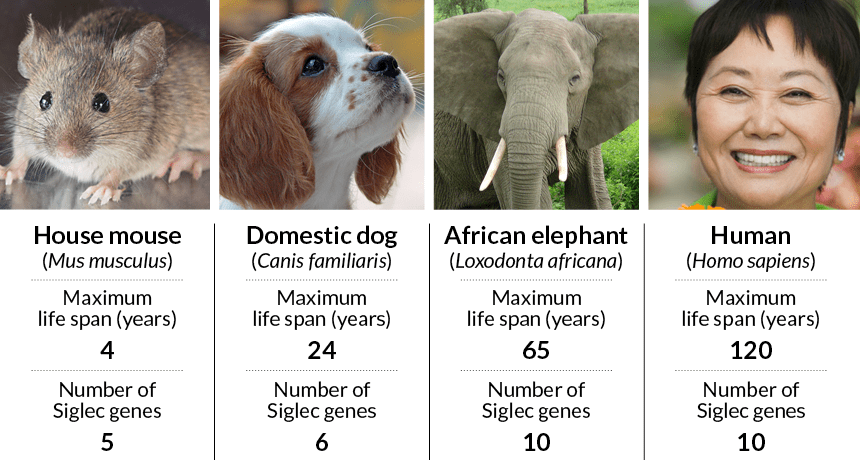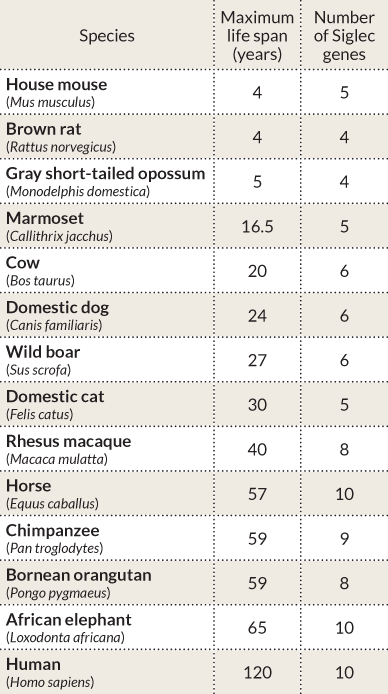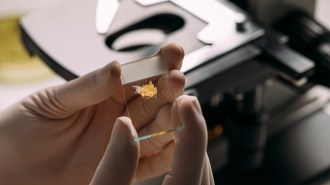
LONGEVITY BY THE NUMBERS How long a species lives depends upon the number of “Siglec” genes it carries. Siglec genes encode immune proteins that may protect against aging by fighting oxidants. Source: Schwarz et al./eLife 2015; Adapted by E. Otwel.
David Illig/Flickr (CC BY-NC-SA 2.0) (mouse); Dedi Sharadi/Flickr (CC BY-NC 2.0) (dog);nickandmel2006/Wikimedia Commons (CC BY-SA 2.0) (elephant); moodboard/Flickr (CC BY 2.0) (woman)
Stocking up on genes that help control inflammation leads to longer life spans for humans and other species, a new study suggests.
Genes encoding some inflammation-dampening molecules are more numerous in longer-lived species, such as humans, than in short-lived animals such as mice, researchers report April 7 in eLife. The genes produce proteins known as CD33-related Siglecs.
Siglecs are proteins that recognize different versions of sugars, called sialic acids, which stud cells in the body. By distinguishing between different versions of sialic acid, the proteins help the immune system decide which cells are normal residents of the body and which are intruders. In addition, the proteins soothe inflammation in the aftermath of such dangers as injury, allergies, or infection. The new findings suggest that Siglecs also help the body deal with reactive oxygen molecules, which can damage DNA and other cellular components and promote aging.
Siglec numbers probably don’t explain why individual people live longer than others, but may be a powerful force in a species’ longevity, says Caleb Finch, a neurobiologist and evolutionary biologist at the University of Southern California in Los Angeles.
The new study, led by Ajit Varki and Pascal Gagneux of the University of California, San Diego, reinforces previous studies suggesting that immunity and inflammation are tied to aging and its associated diseases, Finch said.
Varki, Gagneux and colleagues compared the number of Siglec genes in 17 species of mammals. Longer-lived species had more of the genes. Mice have five of the genes and live up to four years. Humans have 10 and have a maximum life span of 120 years. Dogs fall in the middle with six Siglecs and a life span that tops out at 24 years. The link between life span and Siglec gene numbers held even after researchers adjusted for body mass — another characteristic associated with longevity.

Exceptions may be found, Varki says. “Like anything in evolution, there are no rules. This is just a trend.”
When the researchers genetically engineered mice to lack one of the Siglecs, a gene called Siglec-E, those mice died younger than mice that had all five intact genes. Males especially suffered; only 48 percent of the mutant male mice were left at 100 weeks old, compared with 70 percent of normal males. Female mutant mice lived 17 percent shorter lives on average than normal females did.
Why the mutant mice died younger isn’t clear. They didn’t have obvious signs of disease, although some tissues had more inflammation than normal. The mutant mice did show signs that they were aging faster than normal. They lost a step in their mental abilities and appeared grayer and frailer than their normal counterparts.
That early frailty probably stems from increased vulnerability to reactive oxygen species, also known as oxidants. Reactive oxygen species are side products of metabolism that can harm important molecules in cells, such as DNA, proteins and lipids. Varki’s team found that mice lacking Siglec-E accumulated more oxidant damage to DNA and protein in their livers than normal mice did. The finding suggests that Siglecs protect against oxidative damage, but exactly how they do it isn’t known.
If the hypothesis is correct, adding another Siglec gene to mice should make the rodents live longer. The researchers hope to conduct those experiments, but won’t know the results for years.
The study may give insight into why humans are so prone to inflammation-related diseases, says Laura Dugan, a neuroscientist at Vanderbilt University in Nashville who studies inflammation and brain aging. “We live longer, but don’t age well near the end,” she says. The study provides preliminary but intriguing data that Siglecs play a role in keeping inflammation and oxidative damage — and thus aging — at bay. At some point, she speculates, accumulated exposure to things that tip the balance toward inflammation may overwhelm the Siglecs’ ability to keep up, leading to the infirmities of old age.
Siglecs alone can’t account for humans’ extremely long lives, Varki says. Elephants also have 10 Siglecs, but don’t live past 65. Varki hypothesizes that Siglecs can prolong life into the 60s, but some other mechanism must carry people into old age and past the century mark.
Editor’s note: This story was updated on April 9, 2015, to correct the length of the experiment. The mouse survival rate was evaluated at 100 weeks, not 100 days.






